The Impending Fall of Afghanistan
For years, American troops fought a 'forever war' to delay the inevitable. It's now coming.
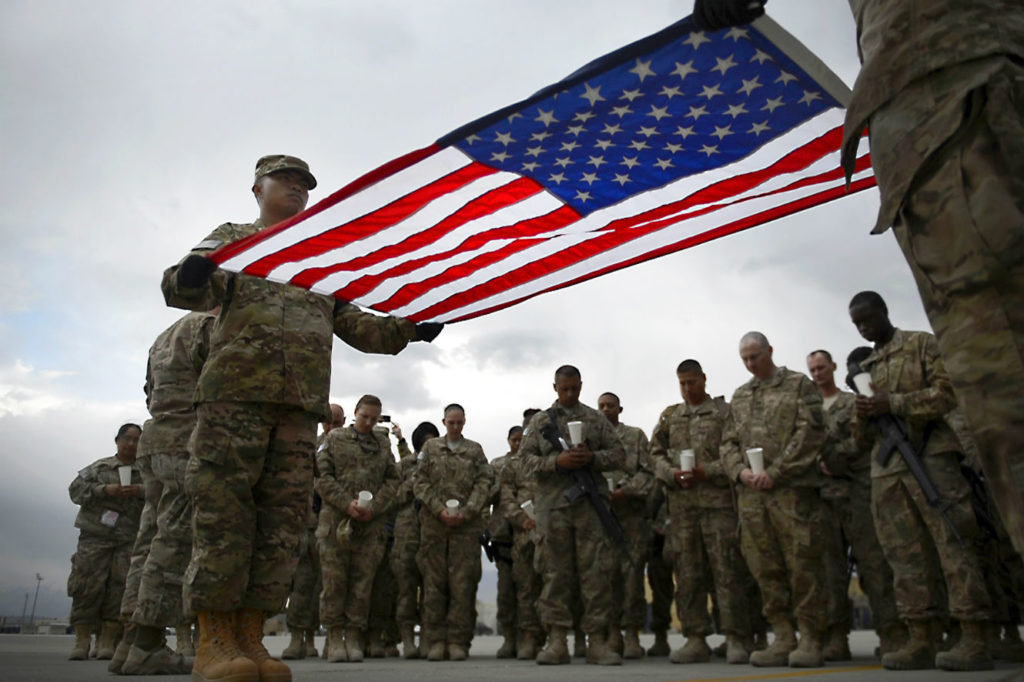
United States military forces are all but out of Afghanistan, weeks shy of the twentieth anniversary of the 9/11 attacks that precipitated our invasion. For more than a decade, critics warned that we must continue a futile mission because otherwise the Taliban would retake control. They were half right.
NYT (“As Afghan Forces Crumble, an Air of Unreality Grips the Capital“):
With his military crumbling, President Ashraf Ghani of Afghanistan fired a crucial part of his command structure and brought in a new one. He created a nebulous “supreme state council,” announced months ago, that has hardly met. And as districts fall to the Taliban across the country, he has installed a giant picture of himself outside the airport’s domestic terminal.
On Friday, U.S. officials announced the definitive closure of Bagram Air Base, the nerve center of 20 years of American military operations in Afghanistan, in the functional end of the American war here. As the last troops and equipment trickle out of Afghanistan, an atmosphere of unreality has settled over the government and Kabul, the capital.
[…]
The government passport office has been jam-packed in recent days, filled with a jostling mob, even though visa options for Afghans are severely limited. Some of the humanitarian organizations on which the beleaguered citizenry depend said they would begin limiting the number of expatriate employees kept in the country, anticipating a worsening of the security climate.
The security blanket that the United States provided for two decades haunts the Afghan government’s actions, inactions and policies, fostering an atrophying of any proactive planning, in the view of some analysts. If there is a plan to counter the Taliban advance, it is not evident as the government’s hold on the countryside shrinks.
Some intelligence assessments have said that the Afghan government could fall under pressure from the Taliban in from six months to two years. If that happens, the outlook is likely to be grim for Mr. Ghani and his circle, as recent Afghan history demonstrates. Several of his predecessors in the country’s top job have met violent ends.
[…]
The roots of the current breakdown within Mr. Ghani’s administration are threefold, officials and security experts say: the delusion of security provided by the Americans, whose determination to leave was never fully believed by civilian or military leadership; the tactical disconnect between conventional Afghan forces and the more nimble guerrilla Taliban; and the reduction of the government to the person of Mr. Ghani himself and a handful of aides, foreign-educated, some with families safely abroad.
The WaPo editorial board, which has alternately warned of the consequences of withdrawal and complained of “forever wars,” is stark (“Opinion: Biden’s cold response to Afghanistan’s collapse will have far-reaching consequences“):
When President Biden chose in April to withdraw all U.S. forces from Afghanistan by September, we were among those who judged that the result would be a disaster for the country’s 38 million people — and in particular, its women. Now, that tragedy appears to be unfolding more quickly than even many of the pessimists imagined. In recent weeks, Taliban forces have captured dozens of districts in a nationwide offensive, surrounding several provincial capitals and blocking key roads into Kabul. On Tuesday, the top U.S. military commander in Afghanistan, Gen. Austin S. Miller, met with reporters and warned with remarkable bluntness that “civil war is certainly a path that can be visualized,” adding: “That should be a concern for the world.”
It ought, at least, to be a concern for Mr. Biden, who inherited a difficult situation from President Donald Trump but chose to pull the plug on the U.S. mission rather than fix it. The president ought to be reconsidering the swift withdrawal he ordered in light of the incipient crumbling of an Afghan government and army that the United States spent two decades helping to build. Instead, he has been cold to the country’s plight. Last month, according to the Wall Street Journal, Mr. Biden decided against slowing the withdrawal from the main U.S. air base in the country, Bagram, which some U.S. officials favored; the pullout was completed this week. Last Friday he met with Afghan President Ashraf Ghani at the White House in what was cast as a show of support, only to declare that Afghans would have to “decide their future.”
That future is likely to be bleak, if current trends continue. As U.S. advisers and air support melt away, Afghan army units are being wiped out by the Taliban, or are surrendering without a fight. In desperation, the government has invited ethnic militias to remobilize, risking a return to the anarchic conflict and banditry that plagued the country in the 1990s. Even with that support, the government may not be able to hold on; a U.S. intelligence community assessment that surfaced last week said it could fall within six to 12 months of the U.S. departure.
They are absolutely right about what is to come. But it does not follow that Biden should reverse course.
The United States rightly toppled the Taliban regime, which sheltered Osama bin Laden and his al Qaeda terrorist network and then refused to turn them over after their attacks on our nation. While the notion of turning a tribal society rooted in the 7th century into a modern, democratic nation-state with Western ideals was always folly, it was at least an understandable goal, arguably demanded by international laws and norms. But, twenty years in, we are no closer to achieving that unachievable goal than when we started.
We made some major missteps along the way. We almost surely under-resourced the mission in the early days, prioritizing the ill-fated war in Iraq. But we ultimately put enormous time, money, and effort into the rebuilding effort. We threw some of our brightest military, diplomatic, and academic minds at the project.
Despite our best efforts, the Afghan military remains a sick joke. American officers who commissioned as second lieutenants the summer of 2001 are now lieutenant colonels—in rare cases, full colonels—eligible for retirement. Some privates who participated in the initial invasion are now sergeants major, some of whose own sons and daughters have served tours in Afghanistan.
And, alas, the Afghan government is worse, still. Ghani is a brilliant man who loves his country. But he’s no more than what Hamid Karzai was before him: the mayor of Kabul.
We could stay there another twenty years or another two hundred. The outcome will be the same. At this point, the best we can do is help those who want to leave—and especially those whose lives are now in danger because they put their trust in us—to do so before it’s too late.

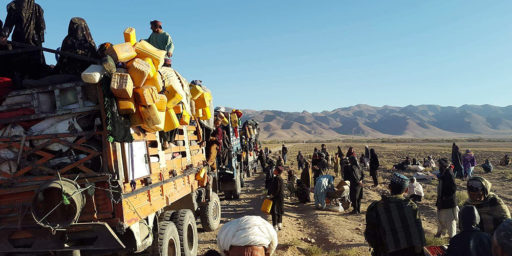
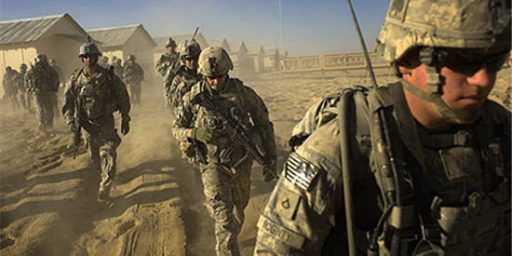
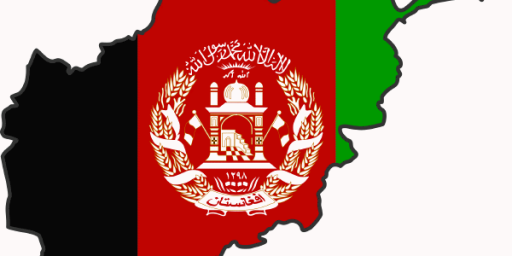
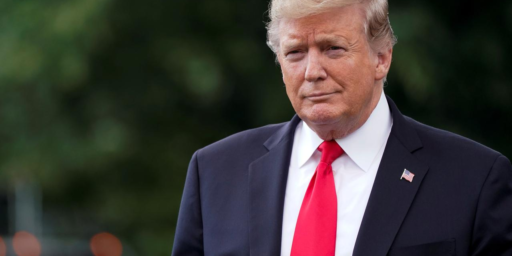
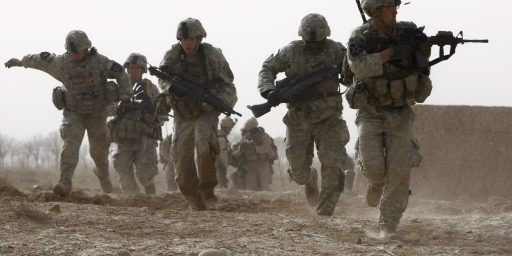
I feel sorry for the Afghans. But we’ve got to remember that this day was always going to come unless we were willing to occupy Afghanistan forever which four consecutive presidents said was not the case. Responding to 9/11 was a necessity; invading Afghanistan led to the occupation which led to today.
I like to believe that the invasion of Afghanistan was well-motivated, that we had the good of both the Afghan and American people at heart which it was mounted. I continue to think it was a mistake and said so at the time. I believed people like Rory Stewart with a lot more ground-level knowledge of Afghanistan than I who predicted the outcome reasonably accurately.
The next complaint about Biden’s decision is that it will cast doubt on future US commitments to allies. There is always a reason to stay. As you pointed out the WaPo editorial board wants to be on both sides of this. They should learn fence straddling can be painful. But then they have no responsibility, except to be judgmental.
Afghanistan is less a country than a collection of fiefdoms, each of which will cut it’s own deal in the best short term interest, while central government after central government has shown itself to be corrupt, lining the leaders pockets at the expense of the people.
Given the amount of money spent by the US and effort expended, the results should have planners at the Pentagon examining why we failed so miserably to prepare the Afghani’s?
“How do you ask a man to be the last man to die in Vietnam? How do you ask a man to be the last man to die for a mistake?”
― John Kerry
There was nothing “right” about toppling the Taliban. Justifiable? Sure. Right? As in being responsible for the resultant mess and doing what it took to fix it? No.
20 years ago I said it was a mistake. I said the same thing 19 years ago.
And 18, and 17, and 16, and 15, and 14, and 13, and 12, and 11, and 10, and 9, and 8, and….
And never once was I wrong.
We were never going to do what needed to be done to get a result we might like, never going to invest the necessary resources. That was obvious from the very beginning when we sent in CIA agents with suitcases of cash instead of the 1st Armored Division (or whatever).
This was inevitable.
We lost this war no later than the day US leadership decided to invade Iraq.
When turning the corner is always two years away you know in the back of your head you are stuck in a no win situation.
Identifiable, measurable, achievable goals beyond vague stabilization.
The initial foray was a mostly good thing. Staying forever was a bad thing. Staying was hubris.
The Brits beat us to that conclusion a while back, I believe. Towards Afganistan in particular.
The aftermath of occupation and downstream consequences lays upon the occupier.
Some bloggers predicted that Biden would not actually go ahead and leave. Looking like we will go ahead. Good on Biden. Hope he doesnt get cold feet.
Steve
Raid yes, invade and occupy, no. We should have beaten the living shit out of Afghanistan, bombed passes, blown up dams, made a hellscape of Afghanistan and then walked away. We don’t have the kind of will and commitment it would take to truly remake Afghanistan.
We need to figure out that we suck at training up local troops. We’re training illiterate third world soldiers to rely on a hundred billion dollars’ worth of airpower they cannot possibly duplicate on their own.
What’s coming for Afghan women is going to be terrible to see.
Looking at the future,there is imminent civil war with loss of civilian lives and a refugee crisis. War lords again to the fore with or without Ghani’s Govt sanction. World powers stayed on delaying the inevitable? But with no improvements this could not have gone on forever. So Biden made the correct decision. There is little outside forces can do now as US pulls out, including Afghanistan’s neighbours. We all watch with bated breaths.
The central problem in Iraq and Afghanistan was the assumption that society is “U-shaped”. If you destroy all the institutions in a society (knocking it down to the bottom of the U), getting it back up the “things are good” side and the “things are shit” side require the same amount of effort, so since we have more resources than the Taliban/ISIS, we’ll ultimately prevail.
In fact, society is “J-shaped”. It’s way easier to get it up the “things are shit” side.
@Michael Reynolds:
The quality of the training is fine, as I’m sure we’ll find out when they start reassembling around warlords in the next few years.
The problem is the will to fight. We always swoop in, imposes these governments of people we like but who have no local support and then are surprised when no one in country wants to risk death for them.
It would be like if, during the Revolutionary War, France decided to get involved, but instead of backing Washington’s army had decided to fund a big army for the Wabanaki Confederation (after all, they were France’s allies during the French and Indian War) and then being surprised the residents of the 13 colonies didn’t really support them.
At basis this is a little more than a feudal society defined by tribal loyalty and identity, permanently stuck in a time before the Middle Ages. Outside of Kabul, it’s pre-Roman Era Britain. I wouldn’t call it a country at all – more a collection of fiefdoms comprised of a lot of autonomous villages. The people in them might spend their entire lives without ever encountering someone from another village down the road unless they were at war with each other. To presume that we could impose a western style society, much less democracy, onto that was always going to be folly.
Pretty convinced that the last guy who had any hope of bringing even a facade of order / consensus died in 2007. It will now return to the (IMO) natural state its wanted to be in since this whole debacle began.
@Stormy Dragon: Well not precisely. Rather more like if the Kingdom of France had in backing Washington had insisted that the Americans adopt various aspects of French royal law, society, and inserted large units of its own forces into the American forces. And further engaged in pointless francisation efforts aimed at the Anglo colonists they were backing.
The Americans backed some real Afghan forces, but in the usual messianic American vision of saving Johnny Foreigner by transforming them into little Americans, engaged in quite a long and pointless transformitive mission. They rather should have simply backed a buffer power of the Northern Alliance zones (aka a Tajik, Uzbek, Turkmens and Hazaras buffer zone against the Pashtun power of the Talebans).
To be modestly fair, the Soviets attempted somewhat analagous efforts from their end of the ideological spectrum (and also intervened not entirely sans rooting in some Afghan factions).
Both imperial powers rather mistook their potiential power to transform Afghanistan (and rather mistook Afghanistan for one nation-state rather than its problem of being a carrefour of ethnicities each being mostly the fringes of neighbours as a artefact of 19th century power limits and borders drawn on that basis, now fossilised as a state.
And as well Shia oriented buffer zone in informal arrangement with Iran, the Twelvers being no friends to the Sunni supremacist Taleban Pashtuns.
@Lounsbury:
The government wasn’t local though. e.g. Ashraf Ghani left Afghanistan as a teenager in the 60s and didn’t come back until the 2000s, spending most of the time in between living in the US. Not surprising he’s seen as an outsider by the people who live there.
Reagan became beloved for the “miracle of Reaganomics” because he and Voelker decided to have their big recession early in Reagan’s first term, so everything after that looked good. I trust Biden absorbed the lesson and will try to get this over as soon as possible.
I see in the WSJ quote they acknowledge Trump started this withdrawal, but will hold Biden responsible for not somehow magically reversing it.
Bagram may be just a week or two from falling when that goes getting people out of there will be significantly more challenging. Helicopters only, I suppose. The embassy is in Kabul is not a place we want to have an Alamo, but Kabul could find itself suddenly encircled with all land routes cut off. On the plus side it’s almost difficult to imagine the Pentagon not anticipating and carefully planning for the final stages of evac, and the talib leadership knows we just want to leave and has no reason to do something which needlessly sparks a big-time response from the USAF.
Let’s hope.
@HarvardLaw92: Charming this and related, but Afghanistan before then Sovs came in was more than pre Roman Britian.
The fatal flaw of Afghanistan is not the state of society but the fact it is a 19th century imperial confetti which is fossilised, leaving a religious-ethnic map that is not coherent except in the context of Anglo-Russian-Iranian power reach as it was in the late 19th century…
And broken in any social cohesion that was growing organically by the long Soviet occuption.
@Michael Reynolds: As noted, this mistakes the problem. It is not training the soldiers.
It is the organic social roots of the central state to which you are attaching such army and soldiers.
The problem with American efforts – with really only cosmetic differences between Left and Right, is you veer from messianic visions of transforming the world into little Americas (variations merely in colour depending on Left or Right) to pure ahistorical dismissal of such areas as the Afghans as irredeemable primatives, never understanding the superficial magical nature of your understandings.
@Stormy Dragon: That was effectively my point my dear. The Americans did have some local forces, but in the end they – the Americans – were not any more capable than the Brezhnev era Sovs in not engaging in magical societal transformative games (one must allow that if one is ready to be quite as quasi-genocidal as Lenin and Stalin, as per the Sovs of the 20s and 30s one can indeed achieve breaking and remaking a society – but it does rather require being ready to walk right up to outright genocide: see Soviet transformation of Central Asia of aforementioned period).
Lest it be misinterpreted, the evocation of the Sov transformation of Central Asia is not made in an approving fashion.
It is better that the Americans have not quite been able to quite combine messianism and quiant hand-wringing concern over the poor Afghan women (at least those appropriately sympathetic to Americans), into self-delusional propaganda to enable near genocide as the Bolsheviks managed with themselves although the Saving the Backward and Poor Women narratives have some similarities.
@Lounsbury:
Of course, the British would never engage in such activities (which is a tongue in cheek way of lobbing back the insinuation that a good deal of the problems and instability in the modern world, indeed those of Afghanistan, can be attributed to British imperialism and its messianic vision of transforming the world into little pseudo-Britains it could then exploit for its own gain).
If we’re guilty of empire building, perhaps its worthwhile to note where we learned that particular trick from?
@gVOR08:
The problem for the Journal, Post and the DC insiders whose water they are carrying is that the American people don’t give sh$t what happens to Afghanistan.
@HarvardLaw92: Of course the old Empire and I said the imperial confettis fossilised into states are a substantial root. But the Empire was not in general afflicted with the Messianic vision à la Soviets and the Americans.
That is generally wrong. Rather the sin of the Empire goes in the other direction – until post WWII – of exploitive neglect quite content to leave the ‘native’ to rot under the exploitive heel of imperial agents – only the absolute native elite being of useful concern to anglicise. An aristo approach and vision, not the messianic broad cultural transformation of Bolshevik ideology (or American Shining City on the Hill). Rather more efficient and socially unprovoking – except the whole economic exploitation thing of course – than transformation.
And those troublesome ungovernable border regions, that’s what buffer zones and local Rajs are for with a modest pretence of Crown agency.
Your problem is that you didn’t learn the particular tricks (not that I am advising one should, as its morally corrosive and unhealthy).
But for Afghanistan the lesson should have been learned, one doesn’t transform, one backs some convenient Seigneur de Guerre or two as your local Raj and local society quite left to its own devises aside from perhaps backing the suppression, for perfomative moral reasons, of particularly flagrantly nasty local customs – slave trading, burning widows, that sort of thing.
@Lounsbury:
Thanks for clarifying, honey.
It should be added that modern media, etc since middle 20th century probably rendered the old imperial hypocrisy and pretence unsustainable regardless… but one should not be duped by 1950s ‘Commonwealth’ maquillage put on the imperial masque – the old British empire for most if its life (ex-settlement colonies) really gave almost no fucks in real practice about messianic social transformation of natives. Only real effort was on a narrow anglicisation of elites to serve the Empire (and investment too rather purely in service of that).
@Michael Reynolds: “We need to figure out that we suck at training up local troops. We’re training illiterate third world soldiers to rely on a hundred billion dollars’ worth of airpower they cannot possibly duplicate on their own. ”
Because we are trying to build a nation where there are clans, tribes, local ‘governments’, etc.
These things took centuries to build in the West, and the US government did not have the desire.
@Stormy Dragon: Or made it clear that the only allowed government was the French crown and its nobility and officials.
@Lounsbury:
So, in other words, you’re advising that we approach Afghanistan like you approached India. Noted.
@Stormy Dragon:
Our “friend” is what his or her fellow Brits deem an insufferable tw@t.
(Sorry to drop that t bomb. Not language I normally use.)
—
The first time I heard c**t used as a workaday idiomatic reference (used quite affectionately in a taking/giving the piss context in that instance) my brain went whoa holy crap what the bleep is happening? Is this a fight?
Nope. Usage I was unaware of. No big deal at all. Although to American ears jarring and intentional and blatant line-stepping.
Akin to their reaction when we use “fanny” as a euphemism for butt.
@Michael Reynolds:
Re:
Not necessary. The efforts of the Bush II administration to conflate the Taliban with AQ was an enormous success, but it ain’t true. OBL kept his Tali hosts ignorant of 9/11, he used Saudis, Pakis, and trained them mostly overseas. All we had to do is what we did, chase them into the mountains with air power and a small force of the Pashtun’s traditional enemies, but we should have had enough to surround Tora Bora and kill OBL. At that point we merely had to tell the Talibs to not mess around with takfiri Arabs and we would leave them be.
The taliban was searching for a way out when we attacked diplomatically, a way around their common law, partly Islamic in origin but mainly tribal Pashtunwali code, that one must defend one’s guest, no excuses, and against all odds. This was documented when a tribe fought to save the last surviving SEAL in the the Lone Survivor incident. Honor is EVERYTHING in medieval societies.
Here’s another insight: The Oral History of the Taliban.
There are two main types of fundamentalist: Those who seek to spread it to others, by force if need be, and those who seek to wall out the rest of the world. AQ and ISIL are the former, Talibs the later. This is understandable due to their respective geographies. The Arabs are part of the industrialized world and located atop the world’s key component of that. They are connected to the world, willingly or not, and there’s no escaping that fate. The Talibs are located in a place nobody gives a damn about, or shouldn’t give a damn about. Bunch of poor mountaineers just barely keep the family fed.
Unfortunately for us, they have a long tradition of constant war with each other. Training? What war college did Cochise attend?
@HarvardLaw92: No, you rather seem to have again missed the point, from lack of historical learning perhaps. Like the late British empire approached… Afghanistan. It was done for a reason, after a failed attempt to treat Afghanistan like India. Only approach that worked reasonably okay for all concerned, including Afghans, up to the little 1979 opening of the current unpleasant devolution. (I didn’t approach Afghanistan like anything personally although I have been to Mazar-i-Sharif on quixotic American government funded investment assessment, pointless waste…)
@Barry: Well more as I said, if the only appropriate and allowable model was one drawing on the French model, and proper alignment with French law, custom, etc.
@de stijl: You needn’t condemn any British, dear whinging little person, my personal familial history if one with Imperial confettis, and we’re rootless cosmopolitans.
Picking less-worse warlords should have been our game plan. A loose collection of local warlords, who know which side of the bread has butter and which side has air strikes.
As was mentioned by others, it all went wrong with Iraq.
But it went wrong even BEFORE we invaded Iraq.
Extremely typical GOP denial of reality, distrust of intelligence as well as the international community led to the dominos that created our downfall.
We invaded Iraq in 2003. That makes 8 years of the GOP denying reality. No surprise that the spoon-fed lies led to the ability to believe that overthrowing our own government would be patriotic.
America is over, and its corpse lies in Afghanistan.
@Michael Reynolds:
And would have been just as terrible under your plan–or mine, as far as that goes. There are certain things that military force and political theory can’t accomplish. Rebuilding another cultutre to a loose approximation of a vague theory that we haven’t even managed to implement all that successfully in “our own house” is one of them.
@Lounsbury:
Let me be a little less succinct – considering the manner in which Britain absolutely fucked up the world (Middle East, Asia, Iran, on and on) for its own benefit, first in service of empire and now in service to the pretense of empire theater, it’s the height of presumptuousness and paternalism to presume that anything it has left to say is of the slightest relevance, indeed of usefulness. I can’t think of many current hotspots of instability that don’t have British arrogance and hubris to thank for their situation, so you might grasp how others might take umbrage at being lectured about getting it wrong. Perhaps it’s worth considering whether the continued pretense of a British seat at the table is of any usefulness.
We’ve done as least as well as you did. We certainly couldn’t do any worse.
@dazedandconfused:
The Taliban knew Al Qaeda was a terrorist organization when they gave them sanctuary. You might as well invite the Mafia to stay in your summer home and then play innocent when they turn out to be running a whorehouse.
@HarvardLaw92:
Indeed. The American ‘Empire’, composed of bits we stole from the Indians, and other bits we bought from the French who stole it from the Indians, and other bits we stole from the Mexicans who stole it from the Indians, and bits we bought from the Russians who stole it from the Indians, plus Hawaii which we stole from the Hawaiians, and Puerto Rico which we stole from Spain, is fully integrated into the USA.
We did less well with Cuba and the Philippines, but by God, when we steal land we keep it, and fill it with fast food restaurants. The key failing of the British Empire was obviously the lack of food products with which to addict and then be-fatten the local population. You can’t build a durable empire on scones and boiled vegetables.
@HarvardLaw92: Ah, tender provincial egos. But as it’s neither Crown nor British gov nor even soon-blue again passport holding speaking, so really immaterial to the point any misplaced provincial resentments against an old metropole. The historical lesson is what it is, regardless of being resentful about missing it.
@Michael Reynolds: yes, quite. Rather too special a pretense.
@Michael Reynolds: No, but tea, opium and curry do rather well for a century or so. Perhaps two depending on how you count.
However stealing the land model and wiping out the abos as continental settlement colonization is a totally different business model I’m afraid, from imperial control business model. Rather like restuaranteuring versus event catering…
@Lounsbury: However for clarity let me draw attention to my statement that the old Empire’s old model was morally corrosive… (also economically questionable). That’s not an endorsement generally.
Afghanistan however is unkind historically to high mindedness. The lesson was there.
@Michael Reynolds:
Like the terrible things that came for the Uighurs, we probably won’t see it.
@Lounsbury: This has to be a parody account like Tyrell.
Ridiculous faux upper-class insufferable British twit lecturing the provincials on how they should run their empire? He should toss in some phrenology while he’s at it.
“Tut, tut, old friend, what you chappies seem to be forgetting is that the Arab mind is incapable of holding thoughts of universal equality — which you can see quite clearly if you use calipers to measure the skull around the frontal cortex, there simply isn’t the space for such thoughts. The Empire long recognized this, and only began to falter when our dedication to these ideals began to falter. Good job exterminating the Native Americans, tally-ho!”
I’m not sure whether it is better or worse than the nihilism that passes for big thought on the right, or the bleeding heart “be the change you want to see in the world” on the left, but it’s devoid of useful thought.
(Everyone knows the correct approach to all problems is incrementalist socialism)
@HarvardLaw92:
Well they could bring the tea, I’d mention beer, but the Irish and gazillion micro breweries around the world have that covered.
@Michael Reynolds:
As was pointed out above, the Taliban was caught in the tradition of protecting a guest. Yes they knew AQ was a terrorist organization, but they also acknowledged that AQ was an outgrowth of the mujaheddin that helped drive the Russians out and therefore felt a debt to them. Add to that there was no love for the heathen west and AQ being co-religious, they made a stupid choice.
@Michael Reynolds:
Bin Laden also fought with the mujahedeen in the war against the USSR. They felt some obligation.
@Lounsbury:
Of course. That said, if we had any use for the British position, we have needed look no further than the nearest history book.
Filed under “what not to do”.
I did find the provincial bit amusing though, so thanks for that. I think it’s a rather reversed viewpoint, considering the Potemkin village it’s originating from, but that rather defines being British these days. Past glories (and imagined past glories) papering over the cracks in the crumbling edifice. Rule Britannia, indeed…
Also, they were not playing innocent, Bid Laden did not put them in the loop for that op. They too were appalled, and seeking a face-saving way out of the mess, such as handing him over to the “neutral” Swiss embassy in a neighboring Carjackistan or something like that. The name escapes me at the moment.
@Lounsbury:
You enjoy being insulting and condescending, don’t you?
Is that your trollish kink? Have I pegged you correctly?
@Lounsbury:
To be extremely clear, calling a good faith provenly erudite interlocutor “my dear” as a condescending slag off is off the charts bad behavior.
You were overtly trolling. And were rightly and correctly called out.
Skate to the box.
@OzarkHillbilly:
Except that last man isn’t going to be an American.
He’ll be an Afghan.
And likely Afghan whose clan was promised by Americans: “You can rely on us.”
@Michael Reynolds:
“We should have …made a hellscape of Afghanistan and then walked away. …
What’s coming for Afghan women is going to be terrible to see.”
And how happy would said Afghan women have been in said hellscape?
@Stormy Dragon:
“If you destroy all the institutions in a society …”
But the US did not do so.
The wreckage of Afghanistan was due to the actions of the Khalq/Parcham rivalry, and their Soviet sponsors, the collapse of the anti-Soviets alliance into civil war, the fanaticism of the Taliban, and the sheer bloody minded cynicism of the Pakistani sponsors of the Taliban.
The USA was a bit player by comparison, trying vainly to bolster one segment of the remnant of a shattered country.
@HarvardLaw92:
Did you learn it?
If so, how well would you say you learnt it?
@HarvardLaw92:
And how, precisely did the British Empire “fuck up” the Middle East?
British rule in the region east of Egypt began in 1918, at earliest.
And ended around 1948.
So: before 1918. lovely place.
Thirty years of British rule (hah!) place goes to hell.
Oh, come on.
Just a teensy bit of historical perspective here, eh?
btw: IMHO Lounsbury isn’t English, and almost certainly not British, or you can paint me red and call me a radish.
So no point hitting him with that.
I, on the other hand, am most definitely your huckleberry.
The US should pull out of the Middle East completely and let them kill each other off.
This “We will save you!” mentality is pure bullshit, and has been nothing but an anchor around our neck.
If Iran is developing nukes–a direct threat to us and our allies–then we should go in and bomb the ever living fuck out of their nuke-related facilities. If Afghanistan is eating itself up from the inside… that’s not our problem.
In the past 75 years, the US has gone from being “The world’s policeman” to “The world’s schoolmarm”. While, on the other side, we turn a blind eye while Israel tries to eradicate Palestine from the history books.
Taiwan is a sovereign nation.
Hong Kong is a lost cause, but we should accept any and all citizens who want to escape.*
And the best way to defeat the CPC in China is to help the Chinese people to make money. They’re more interested in getting rich than in listening to the CPC.
The US should look at building strong, NSA relationships with S. America and Africa. Robust investment in Africa could lift the continent out of poverty and tribalism, and–if done without strings or fraud–create a massive set of allies.
If we build honest partnerships with S. America, Africa, and SE Asia, the Middle East can be ignored–especially since their one chip–oil–is quickly dropping in value and will become irrelevant in 25-30 years.
=============
*The same goes for anyone from any country (with reasonable exclusions for serious criminals).
@Mu Yixiao:
I do not agree with anything you said here. I consider it horrific.
@de stijl: Calling someone my dear is trollish? Oh good God you’re precious.
@HarvardLaw92: of course provincial is supposed to be amusing and virtually silly, I mean really, if one is seriously ‘insulted’…. (also as I have IDed myself as a confetti, have a think about it). But the position is not “British” as I already said, merely historically aware.
@Sleeping Dog: Tradition bollocks. That’s a Whitesplaining excuse. A traditional guest who launches attacks from one’s house has violated their status (of course tradition is rather like Pirate Code, the Taleban leadership were and are not mere backcountry simpletons had did and do show no small degree of realpolitik cunning within the frame of their wider ideology).
The Talebans in no way were genuinely either innocent nor clean hands, uncritically lapping up post-facto Taleban spin is really one of the more pathetic aspects of the intello-Left discourse on the subject.
@Gustopher: Oh again the sad pathtic knee-jerking, anyone contradicting current Received Wisdom is a troll. I suppose it’s nice the pathetic circa 2020 Russian Troll label has been dropped. Amusing you pathetically turn to a silly narrative applying to me a denigration of Arab (bizarre Orientalist choice really, given we’re talking of Afghans) thinking when I am the only person not either labelling them as irredeemable barbarian primitives or alternatively white knighting them with absurd white-washing of the Taleban with faux explanations of their tradition.